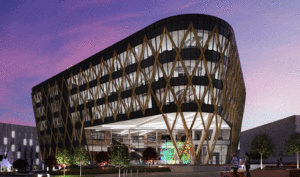Permission has been granted for a major new development which will link up university academic talent with industry and the public sector to help develop skills needed to solve real world problems. The £50m national innovation centre, on Science Central will bring together businesses, academics and the public to support the research and development of new ageing and data-oriented products and services.
The third Newcastle University building to be located on the Science Central site, the centre will be home to the University’s teams from the National Innovation Centre for Ageing (NICA), the National Innovation Centre for Data (NICD) and the National Institute for Health Research Innovation Observatory (NIHRIO):

- NICA works with research specialists, businesses and the public to facilitate the commercialisation of key products, services and technologies to help people live better, longer lives.
- NICD works with partners in industry, the public sector and academics to work on opportunities offered by the explosion in digital data.
- NIHRIO will apply Big Data analytical tools to reveal global trends in health innovation.
Professor Mike Catt, Director of the National Innovation Centre for Ageing, said: “The National Innovation Centre will provide national leadership on the global question ‘how do we age well?’
“By 2050, the number of people in the world aged 60 years or over is projected to more than double, reaching nearly 2.1 billion. This globally ageing population presents many challenges around quality of life and health and wellbeing amongst others as well as multiple economic and social opportunities.
“Similarly, the explosionn of digital data has the potential to transform business and public services products worldwide, offering huge opportunity for the investigation and application of new processes and services.
“This new building will provide NICA and NICD with a much-needed facility to bring together industry, experts and the public under one roof to drive the collaborative development of new products and services and cement the North East as global trailblazer in innovation.”
The building as a catalyst for innovation
“The exciting new building will act as a beacon for innovation, attracting companies from around the world, and placing the North East as a global leader in this vital area” Professor Paul Watson, National Innovation Centre for Data
Designs for the building have been developed by a team at GSSArchitecture, based at Holts Yard, Newcastle, who have applied findings from global research into the design and layout of the centre as a catalyst for innovation.

The company has undertaken detailed consultation with stakeholders, including the University and public, to develop and refine ideas before the planning application was submitted.
Jonathan Hunter, Partner at GSSArchitecture said: “The GSS designed National Innovation Centre represents true destination architecture through a simple, yet powerful, triangular design form. The building will be both distinct and highly identifiable and will be a vibrant landmark at Science Central.
“The design makes the most of the public realm and encourages the external landscape to flow into and integrate with the National Innovation Centre, encouraging public interaction and creating a welcoming and inviting arrival experience.
“The building is publicly accessible at ground and first floor, with a range of innovation suites and collaboration facilities on the upper three floors. In all areas, the use of circulation space and common areas has been maximised to promote integration and collaboration resulting in the cross-fertilisation of ideas that are the bedrock of innovation.”
Building work is due to begin soon with the building scheduled for opening in 2020.
Data potential
Professor Paul Watson, Principal Investigator for the National Innovation Centre for Data, said: “Vast amounts of data are now being generated by people, software and sensors. Companies in every sector of the economy see the potential to use this data to transform their productivity and launch new products. However, because of a world-wide skills shortage, few organisations are able to realise these benefits. The National Innovation Centre for Data will create a unique facility bringing together industry, researchers and students to address this challenge. It will enable industry to unleash the huge potential for innovation offered by the explosive growth in digital data, so benefitting the UK economy and society. The exciting new building will act as a beacon for innovation, attracting companies from around the world, and placing the North East as a global leader in this vital area.”
NIHRIO
“This will help us accelerate access to new medicines, devices, diagnostics, and services for the benefit of patients.” Professor Michael Trenell, Director of the NIHR Innovation Observatory
The centre will also house the new £10 million National Institute for Health Research Innovation Observatory based at Newcastle University. The NIHR Innovation Observatory will apply Big Data analytics tools, from text mining, machine learning and cognitive analytics to reveal global trends – and global needs – in health innovation.
Director of the NIHR Innovation Observatory, Professor Mike Trenell explains: “By applying Big Data analytics tools, from text mining, machine learning and cognitive analytics we will reveal global trends – and global needs – in health innovation. This will help us accelerate access to new medicines, devices, diagnostics, and services for the benefit of patients.”
The Centre is the latest development on Science Central, one of the biggest urban regeneration projects of its kind in the UK. Set to create more than 4,000 jobs, 500,000 sq ft of office and research space and 450 new homes across a 24 acre site, the development will become a major UK hub for scientific research and technology businesses, creating knowledge based jobs for future generations.
The site is home to multiple Newcastle University developments, including the Urban Sciences building, which houses international research into digitally enabled urban sustainability.
Source: http://www.ncl.ac.uk/press/news/2017/11/nationalinnovationcentresnicanicd/
Posted in: General, Life Sciences
